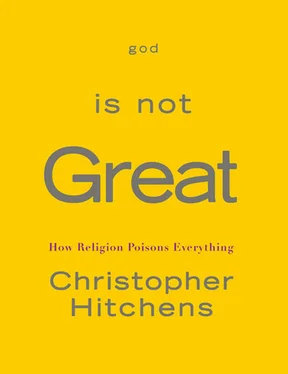Schoolchildren “held in preparation for slaughter”… Perhaps you remember the pope’s denunciation of this ineffaceable crime, and of the complicity of his church in it? Or perhaps you do not, since no such comment was ever made. Paul Rusesabagina, the hero of Hotel Rwanda , remembers Father Wenceslas Munyeshyaka referring even to his own Tutsi mother as a “cockroach.” But this did not prevent him, before his arrest in France, from being allowed by the French church to resume his “pastoral duties.” As for Bishop Misago, there were those in the postwar Rwandan Ministry of Justice who felt that he should be charged as well. But, as one of the officials of the Ministry phrased it: “The Vatican is too strong, and too unapologetic, for us to go taking on bishops. Haven’t you heard of infallibility?”
At a minimum, this makes it impossible to argue that religion causes people to behave in a more kindly or civilized manner. The worse the offender, the more devout he turns out to be. It can be added that some of the most dedicated relief workers are also believers (though as it happens the best ones I have met are secularists who were not trying to proselytize for any faith). But the chance that a person committing the crimes was “faith-based” was almost 100 percent, while the chances that a person of faith was on the side of humanity and decency were about as good as the odds of a coin flip. Extend this back into history, and the odds become more like those of an astrological prediction that just happens to come true. This is because religions could never have got started, let alone thrived, unless for the influence of men as fanatical as Moses or Muhammad or Joseph Kony, while charity and relief work, while they may appeal to tenderhearted believers, are the inheritors of modernism and the Enlightenment. Before that, religion was spread not by example but as an auxiliary to the more old-fashioned methods of holy war and imperialism.
I was a guarded admirer of the late Pope John Paul II, who by any human standards was a brave and serious person capable of displaying both moral and physical courage. He helped the anti-Nazi resistance in his native country as a young man, and in later life did much to assist its emancipation from Soviet rule. His papacy was in some ways shockingly conservative and authoritarian, but showed itself open to science and inquiry (except when the AIDS virus was under discussion) and even in its dogma about abortion made some concessions to a “life ethic” which, for example, began to teach that capital punishment was almost always wrong. On his death, Pope John Paul was praised among other things for the number of apologies he had made. These did not include, as they should have done, an atonement for the million or so put to the sword in Rwanda. However, they did include an apology to the Jews for the centuries of Christian anti-Semitism, an apology to the Muslim world for the Crusades, an apology to Eastern Orthodox Christians for the many persecutions that Rome had inflicted upon them, too, and some general contrition about the Inquisition as well. This seemed to say that the church had mainly been wrong and often criminal in the past, but was now purged of its sin by confession and quite ready to be infallible all over again.
CHAPTER FOURTEEN
There Is No “Eastern” a Solution
The crisis of organized religion in the West, and the numberless ways in which religious morality has actually managed to fall well below the human average, has always led some anxious “seekers” to pursue a softer solution east of Suez. Indeed, I once joined these potential adepts and acolytes, donning orange garb and attending the ashram of a celebrated guru in Poona (or Pune), in the lovely hills above Bombay. I adopted this sannyas mode in order to help make a documentary film for the BBC, so you may well question my objectivity if you wish, but the BBC at that time did have a standard of fairness and my mandate was to absorb as much as I could. (One of these days, having in the course of my life been an Anglican, educated at a Methodist school, converted by marriage to Greek Orthodoxy, recognized as an incarnation by the followers of Sai Baba, and remarried by a rabbi, I shall be able to try and update William James’s The Varieties of Religious Experience .)
The guru in question was named Bhagwan Sri Rajneesh. “Bhagwan” simply means god or godly, and “Sri” means holy. He was a man with huge soulful eyes and a bewitching smile, and a natural if somewhat dirty sense of humor. His sibilant voice, usually deployed through a low-volume microphone at early-morning dharshan , possessed a faintly hypnotic quality. This was of some use in alleviating the equally hypnotic platitudinousness of his discourses. Perhaps you have read Anthony Powell’s tremendous twelve-volume novel sequence A Dance to the Music of Time . In it, a mysterious seer named Dr. Trelawney keeps his group of enlightened followers together in spite of various inevitable difficulties. These initiates can recognize each other not by the individuality of their garb but by an exchange of avowals. On meeting, the first must intone, “The essence of the all is the godhead of the true.” The proper response to this is, “The vision of visions heals the blindness of sight.” Thus is the spiritual handshake effected. I heard nothing at the Bhagwan’s knee (one had to sit cross-legged) that was any more profound than that. There was more emphasis on love, in its eternal sense, than in Dr. Trelawney’s circle, and certainly there was more emphasis on sex, in its immediate sense. But on the whole, the instruction was innocuous. Or it would have been, if not for a sign at the entrance to the Bhagwan’s preaching-tent. This little sign never failed to irritate me. It read: “Shoes and minds must be left at the gate.” There was a pile of shoes and sandals next to it, and in my transcendent condition I could almost picture a heap of abandoned and empty mentalities to round out this literally mindless little motto. I even attempted a brief parody of a Zen koan: “What is the reflection of a mind discarded?”
For the blissed-out visitor or tourist, the ashram presented the outward aspect of a fine spiritual resort, where one could burble about the beyond in an exotic and luxurious setting. But within its holy precincts, as I soon discovered, there was a more sinister principle at work. Many damaged and distraught personalities came to Poona seeking advice and counsel. Several of them were well-off (the clients or pilgrims included a distant member of the British royal family) and were at first urged—as with so many faiths—to part with all their material possessions. Proof of the efficacy of this advice could be seen in the fleet of Rolls-Royce motorcars maintained by the Bhagwan and deemed to be the largest such collection in the world. After this relatively brisk fleecing, initiates were transferred into “group” sessions where the really nasty business began.
Wolfgang Dobrowolny’s film Ashram , shot in secret by a former devotee and adapted for my documentary, shows the “playful” term kundalini in a fresh light. In a representative scene, a young woman is stripped naked and surrounded by men who bark at her, drawing attention to all her physical and psychic shortcomings, until she is abject with tears and apologies. At this point, she is hugged and embraced and comforted, and told that she now has “a family.” Sobbing with masochistic relief, she humbly enters the tribe. (It was not absolutely clear what she had to do in order to be given her clothes back, but I did hear some believable and ugly testimony on this point.) In other sessions involving men, things were rough enough for bones to be broken and lives lost: the German princeling of the House of Windsor was never seen again, and his body was briskly cremated without the tedium of an autopsy.
Читать дальше












